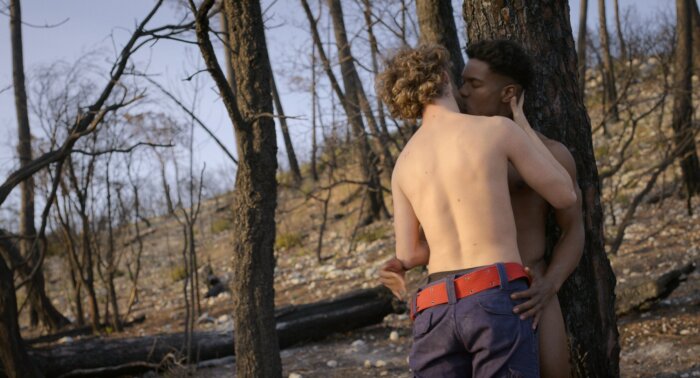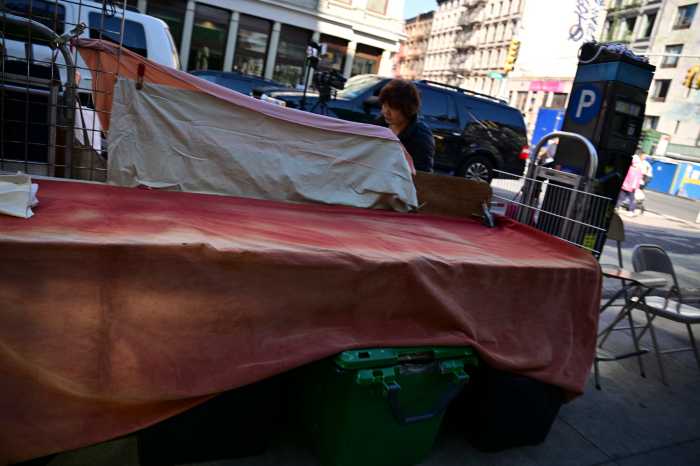“Will-o’-the-Wisp” is the latest provocation — dubbed a “musical fantasy” — by out gay Portuguese filmmaker João Pedro Rodrigues. An extended prologue introduces Prince Alfredo (Mauro Costa), whose parents are shocked by his decision to be a firefighter. As Alfredo pursues his interest in earnest, he is met with derision, but he persists. A hilarious episode has various nude and hunky firemen posing in tableaus and asking art history student Alfredo to “name the painting” they are representing.
When Alfredo also meets fellow firefighter Afonso (André Cabral), who trains him, the two men begin a relationship that starts with a seductive lesson in ventilating a victim and segues into a fabulously choreographed dance sequence. A later sex scene between the men has to be seen to be believed.
“Will-o’-the-Wisp” jumps across time and genres as this queer romance plays out, but Rodrigues also raises serious themes about race, class, colonialism, global warming, and privilege. The director chatted with Gay City News about his new film.

What was your inspiration for this film, which is a love story, a musical, a satire and more?
It’s anecdotal, but it started when I went to the dentist, and I saw a magazine with an article about the descendants of the heirs to the throne. We have lived in a Republic since 1910, but these people still come up in celebrity magazines. I usually don’t read these magazines, but there was an article about these people opening their house so common people can see where they live. I thought it would be a good subject for a film, and I always wanted to make a comedy. It’s a genre that I have never addressed so directly. This made me think about identity — how do you want to portray yourself to others, and what is your truth? That is the dilemma of the prince. He discovers himself as another person by going to the fire brigade. That was the starting point. The film is not about the real royal family. I also wanted to make a musical comedy, so there is music, dance, and romance. [Laughs.] The film is also a love story and a melodrama.
You have a very formal style in the film, from how you frame a dying man, or a dinner table sequence, to how you circle two lovers during a sex scene. What can you say about your visual approach to the material?
The way I see filmmaking, rigor and precision are very important to me. The way you frame a shot is the way you tell a story, so framing and camera movement and mise-en-scène are very important for me. I care about films where I see the point of view of a director. I try to find the only way to tell the story that I want to tell — through camera, framing, movement, and sound. I like that playfulness. The film has different styles. In the beginning it is more theatrical. The dinner scenes have long takes, and it moves from the more formal world into the more liberated world of the firemen.
Can you talk about staging the tableaus featuring naked firemen posing?
I didn’t invent anything. The inspiration came from real firefighters’ calendars. I imagined they could be reproducing paintings. I learn to tell stories from looking at paintings, so it was an excuse to re-create painters I like. Some are based on real paintings, and some are not. They come from different times in art history, from Caravaggio to Francis Bacon. There’s one by a Portuguese caricaturist, José Vilhena, who lived during the fascist regime in Portugal, so it’s not all high art. The firemen are aware that it is mostly gay men who buy those calendars. I like the idea that they have a playful gaze in their own profession.
You also tackle some pretty heavy subjects in the film, from colonialism to global warming. Can you talk about making “Will-o-the-Wisp” a “political” film?
I thought that comedy was perhaps the best way to tackle those subjects in a way that is playful and ironical. They are heavy subjects, as you say, but I think you shouldn’t only deal with them in a heavy way. I wanted to bring some fun. It is not that I am not making fun of it, but I’m making fun of the seriousness — of course, it’s serious — but you don’t always have to be serious. The questions of colonialism and racism in the film are dealt with through love, and through love and sex they are appeased. The sex scene in the forest is a source of role play, and through sex, they are trying to heal some of our colonial wounds. These wounds won’t ever be healed; it is part of the past, and our past was a time when we were ruled by kings. Portugal, and every European country, was made out of conquering or colonizing neighboring countries, or by chasing out people who are living there. Portugal was founded by a Christian king who chased Muslims to Spain first then to Morocco. All the history of Europe is built out of that. In the end of the film, finally, we have a Black president as a ruler. There is a “hope,” that we might have a Black, Muslim president. Europe does not have that. With the uprise of the extreme right movement, it is kind of scary. I’m playing into a brighter future.
This film continues your interest in the Portuguese royal family, which you explored in your earlier short “The King’s Body,” which explores issues of power and control, a theme throughout your films. Can you talk about this subject and why you explore it?
There is power and control in all human relationships, even in love. It’s a balance between those feelings. I think my films are more about desire and how you deal with your own self, and how do you express your own self to others. Sometimes it is in a more violent way, and sometimes it is in a less violent way. The prince represents a whole past of power that is meaningless nowadays.
Still in a lot of countries there are kings and queens, and these people live as if they were playing the same role since the 12th century when Portugal was founded. There’s an idea of a lineage, and they have to fulfill a destiny. When his father dies, the prince breaks up with his lover because he is destined to replace his father in the family lineage. That is the tragedy of the film. He cannot live happily ever after, even if it is a fantasy; that lineage does not exist anymore, but he feels he has to fulfill it. These identity questions are also a kind of game playing. That’s why the film is theatrical in the beginning. They are playing their little “aristocratic” game. They are pretending that they are the people their ancestors were, that royal blood flows in their veins. Even though Portugal is no longer a monarchy, there is a symbolical power that has never stopped. That is the difference of classes. They belong to a royal, or aristocratic class, while Afonso is from the people, and a Black person. The film is built into those antonyms.
How do you want viewers to process your film? Is it meant to titillate and provoke?
The idea was to make people think about these identity questions, but also have fun. In arthouse films, you don’t usually have a lot of fun. They are usually serious and super long. I wanted to make something that was apparently light, and you could laugh with.
Filmmaker João Pedro Rodrigues will be in attendance for a post-screening Q&A May 26-27. His 2019 short, “Potemkin Steps,” will screen with the feature.
“Will-o-the-Wisp” | Directed by João Pedro Rodrigues | Opening May 26 at the IFC Center | Distributed by Strand Releasing













